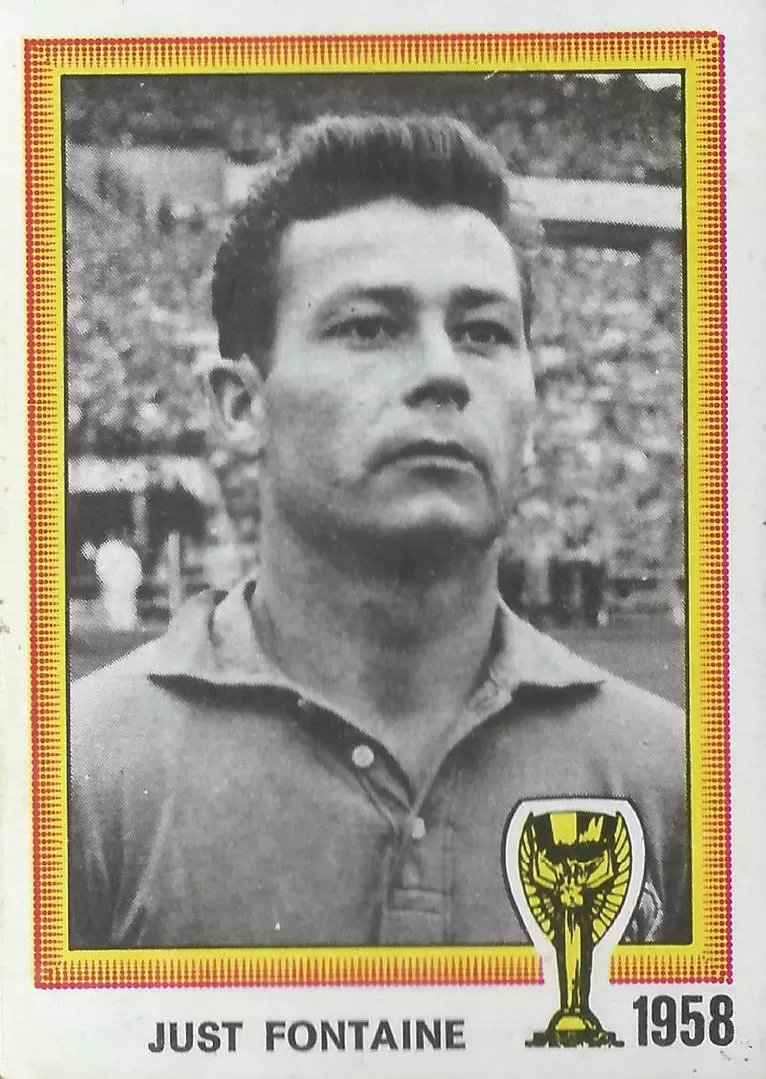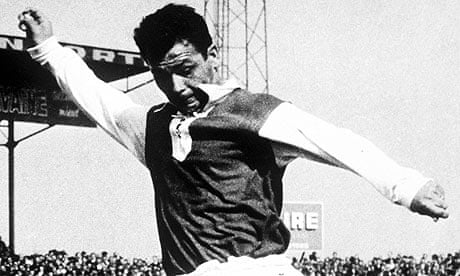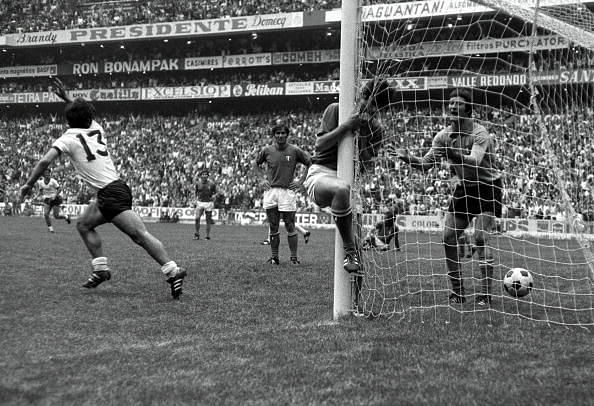The extraordinary journey of Just Fontaine.
Just Fontaine's record of scoring the most goals in a single World Cup tournament, 13 in 1958, still stands today, despite the tournament having been
Kylian Mbappé's victory as the top scorer of the 2022 World Cup in Qatar, with 8 goals, is a remarkable achievement, especially at the young age of 24.

However, it is not a record for France, as it is surpassed by Just Fontaine's 13 goals in the 1958 World Cup. Fontaine's record of most goals in a single tournament might never be broken, as only three players have ever scored in double figures in a single tournament, Gerd Muller (10 in 1970) and Sandor Kocsis (11 in 1954) being the other two.
Fontaine's achievement is even more remarkable as he went into the tournament with just five caps to his name, he scored a hat-trick on his international debut and wasn’t picked for another three years. He was a player with pace, who could score with both feet and had an ideal creator in Raymond Kopa, similar to players like Papin, Butragueno, and Rossi.
Just Fontaine, born in Marrakech, Morocco, was a French professional footballer known for his record of scoring the most goals in a single World Cup tournament, 13 in 1958. He was born in a region that was divided by France and Spain in 1912, with Marrakech being part of French Morocco. He began his career at USM Casablanca before moving to Nice in France in 1953. In his first season in France, he won the cup and two years later he won the league.
In December 1953, he grabbed the attention of the national selectors for the World Cup 1954 but wasn't selected for the final squad. France didn’t make it past the group stage with only a win over Mexico the highlight.
In 1956, he moved to Stade de Reims as a replacement for the legendary Raymond Kopa, who was off to Real Madrid. Kopa had just played in the Reims side which was 3-2 up against Real in the inaugural European Cup Final, only to lose 3-4. Kopa played in the iconic Real side with Puskas and Di Stefano and won three successive European Cups, including a second meeting with Reims in 1959. Fontaine was on the French side that day but Real won comfortably. Kopa then returned to Reims to strike up a potent attacking partnership with Fontaine. Fontaine’s second cap came in October 1956 at home to Hungary, where the French side lost 2-1.

In 1957, French football player Just Fontaine faced Hungary in his third international match, but the Hungarians ultimately emerged victorious. The following year, Fontaine was selected for the French national team's first international match of 1958, a friendly against Spain. He could have played for Spain due to his mother's Spanish heritage, but ultimately chose to play for France. At this point, Fontaine had only four caps to his name and the team had already qualified for the 1958 World Cup in Sweden. In the friendly match against Spain, Fontaine scored the equalizer four minutes into the second half, earning a 2-2 draw. A month later, he was also in the starting lineup for a goalless draw against Switzerland.
Despite his limited experience and lack of recent goals, French manager Albert Batteux was confident in Fontaine's potential and believed he would benefit from the creativity of teammate Raymond Kopa. Batteux was a former player and manager at Reims, and had led the team to three Ligue 1 titles. Fontaine was one of six Reims players on the national team, including Jean Vincent, who had also made his debut alongside Fontaine. Of the players on the team, 10 had less experience than Fontaine.
In their opening match of the 1958 World Cup against Paraguay, Fontaine quickly made an impact by scoring the equalizer just 25 minutes into the game. Paraguay had taken the lead from a free-kick on the edge of the box, but Fontaine was able to capitalize on a clear opportunity and score with a powerful shot. Just five minutes later, he put France in the lead with a similar goal, this time with a more measured finish. Paraguay managed to level the score before halftime and eventually took the lead again, but Fontaine's Reim's teammate Roger Piantoni restored parity. Fontaine then completed his hat-trick, and Kopa and Vincent added further goals, leading France to a 7-3 victory.
Three days later, France faced Yugoslavia, who had drawn their opening match against Scotland. Once again, Fontaine opened the scoring for his side, this time in the opening five minutes. However, Yugoslavian player Aleksander Petakovic equalized in the 16th minute. Petkovic had also scored the Yugoslav's goal in their match against Scotland.

After Just Fontaine's dramatic equalizer in the final five minutes of the match, it seemed that the game between France and Yugoslavia would end in a draw. However, three minutes later, Todor Veselinovic scored his second goal of the game, securing a 3-2 victory for Yugoslavia.
With Paraguay having defeated Scotland, France knew that a draw in their final group match against Scotland would be enough to advance to the knockout stage. France took the lead midway through the first half, with a goal from Raymond Kopa, assisted by Fontaine. As half-time approached, Fontaine scored his fifth goal of the tournament, putting France up 2-0. Although Scotland got one goal back, France ultimately won 2-1.
The other game in the group ended in a 3-3 draw, which meant that France topped the group. In the quarterfinals, they faced Northern Ireland, who were making their first appearance in the World Cup. Despite the Irish team including notable players such as Harry Gregg, Danny Blanchflower, Billy Bingham, and Jimmy McIlroy, France took the lead right before halftime with a goal from Maryan Wisniewski.
France would go on to win the match 4-0, with Fontaine adding two more goals to his tally in the tournament. This brought his total to 13 goals in just 6 games, a record that still stands today as the most goals scored by a player in a single World Cup tournament. With this performance, Fontaine helped lead France to the semi-finals where they would eventually be defeated by Brazil. Despite the loss, Fontaine's outstanding performance throughout the tournament earned him the Golden Boot award for a top goal scorer and solidified his place in French football history.

In the 55th and 63rd minutes, Fontaine scored two more goals to add to his collection, both assisted by Kopa. The combination of their play was evident as Fontaine switched the ball from his right foot to his left before unleashing a shot too powerful for the goalkeeper. Roger Piantoni then added another goal to secure a 4-0 win for France. Fontaine had scored a total of 8 goals in just 4 matches at that point. Five days later, France faced off against Brazil in the semi-finals. Brazil, who were determined to win their first World Cup, had a formidable player in the 17-year-old Pele. Brazil took an early lead with a goal from Vava, but Fontaine, who was a constant threat on the field, equalized within 10 minutes with a goal assisted by Kopa. He took the ball past the goalkeeper with his right foot and scored with a left-footed shot from a tight angle.
The Solna crowd eagerly watched as the two teams fiercely competed for the remainder of the first half. One notable moment occurred when Fontaine, presented with a chance by Wisnieski from the right wing, failed to capitalize on the opportunity. Despite having ample time and space, he shot high and wide, missing the mark. However, Didi was able to give Brazil the lead before the half-time break.
The second half belonged to the legendary Pele, who effortlessly scored a hat-trick in just 23 minutes, leaving Brazil in a commanding position. Piantoni scored a consolation goal for the opposing team.

The French team, who had previously played in front of the biggest crowd of the tournament, faced a disappointment as they were relegated to the Third Place Play-off against West Germany. Though the Germans had surprised the world by winning four years earlier, reaching the semifinals this time around solidified their talent as a team.
Fontaine once again opened the scoring early on in the match, giving France the lead in the 16th minute. The French team's fast-paced attack style suited Fontaine's own speed and this was his tenth goal of the tournament. Four years earlier, Hungarian forward Sandor Kocsis was the first player to reach this tally in a single World Cup, scoring 11 goals. Fontaine matched this record just 9 minutes before the half-time break, extending the French lead after Cieslarczyk had leveled the score and Kopa had regained the lead from the penalty spot.
In the 1958 World Cup, French striker Just Fontaine set a record by scoring 13 goals in only 6 matches, including a hat-trick in the match against Germany.
His goals demonstrated his ability to score in a variety of ways, such as swift attacks, poaching in the box, and shots from outside the area.
Though Brazil and Pele ultimately won the tournament, Fontaine's goal-scoring prowess was notable, with only Gerd Muller in 1970 having scored more goals in a single tournament. Despite his impressive performance, Fontaine did not receive the Golden Boot award as it did not exist at the time. Additionally, he was not wearing his boots and had to borrow them from a teammate.

Domestically, he was successful with Reims, winning three Ligue 1 titles and twice being the league's top scorer.
In his first season at the club, Just Fontaine scored 30 goals. However, his most prolific season was the 1957-58 campaign, where he scored 34 goals in 26 matches for his club and 14 goals in 9 international matches, for a total of 53 goals in 41 games in all competitions.
This record still stands for French players. That year, his club, Reims, won the league and cup double, and he set a World Cup goalscoring record as France finished third. After the World Cup, he led Reims in the European Cup, scoring 10 goals and reaching the final against Real Madrid, featuring his French teammates Kopa and Di Stefano, and Gento.
27 goals in 18 appearances were the slightly ridiculous-looking stat that he had to his name. Four days later he finished off 1959 with a goal in the 4-3 win at home to Spain.
Seven goals in four matches was another impressive return and showed the World Cup was no flash in the pan. But little did anyone know his days were numbered.
1960 promised to be a big one for France. If they could defend a comfortable first-leg lead against Austria there would be the first European Nations Cup Final stage to look forward to.
Fontaine missed the friendly defeat in Belgium but returned in March to score two goals in three minutes and help his country to a 6-0 win over Chile.
This now gave him 30 goals in just 20 matches. But for the player disaster was to strike as he broke his leg.
Thanks for reading and watching! I will see you next one -->

Subscribe, Like, Comment & Share My Video & Blog. It's Free Of Cost & Help To Grow My Channel Faster.

